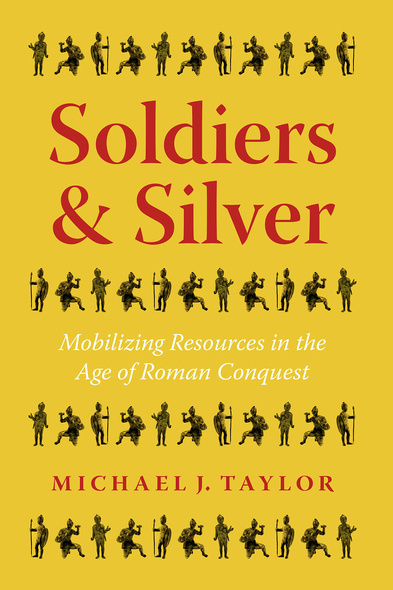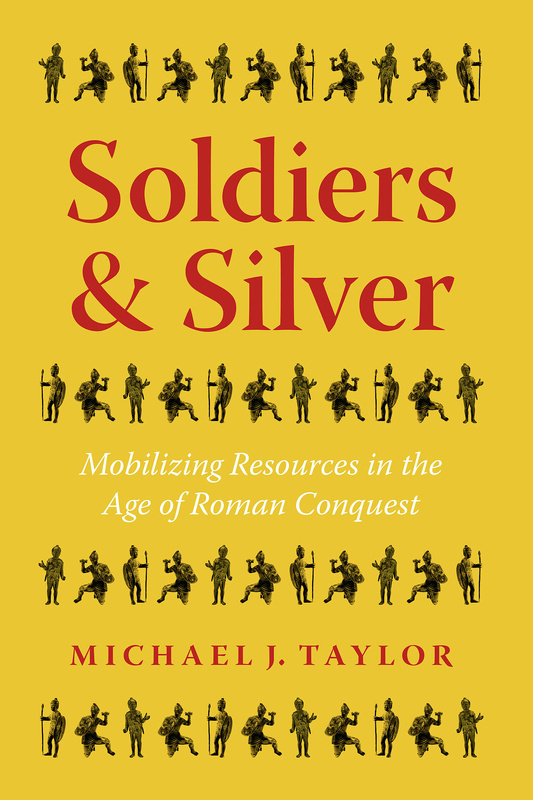Soldiers and Silver
Mobilizing Resources in the Age of Roman Conquest
University of Texas Press
By the middle of the second century BCE, after nearly one hundred years of warfare, Rome had exerted its control over the entire Mediterranean world, forcing the other great powers of the region—Carthage, Macedonia, Egypt, and the Seleucid empire—to submit militarily and financially. But how, despite its relative poverty and its frequent numerical disadvantage in decisive battles, did Rome prevail? Michael J. Taylor explains this surprising outcome by examining the role that manpower and finances played, providing a comparative study that quantifies the military mobilizations and tax revenues for all five powers. Though Rome was the poorest state, it enjoyed the largest military mobilization, drawing from a pool of citizens, colonists, and allies, while its wealthiest adversaries failed to translate revenues into large or successful armies. Taylor concludes that state-level extraction strategies were decisive in the warfare of the period, as states with high conscription and low taxation raised larger, more successful armies than those that primarily sought to maximize taxation. Comprehensive and detailed, Soldiers and Silver offers a new and sophisticated perspective on the political dynamics and economies of these ancient Mediterranean empires.
The great strength of this book is that it is comparative; all too often studies probing Roman victory focus too much on Rome and consequently miss things about Rome’s rivals...Taylor considers the systems of all of the major players in the Mediterranean state system...and that fact alone puts this study head and shoulders above similar older efforts.
An interesting read…Taylor has succeeded at clarifying an often-unclear topic with some fine scholarship.
This book will be of interest to anyone with a serious interest in the mechanics of ancient Roman and Hellenistic warfare. Its emphasis on the interplay between recruitment and finance – an aspect that has only recently received more scholarly attention – shows the importance of a solid financial structure behind any military venture.
Soldiers & Silver is an important and valuable study for ancient military historians...Soldiers & Silver provides the basis for renewed debate among specialists about ancient military manpower, finance, and the relationship between war and the state...Taylor’s work is a good candidate for a graduate course and a valuable addition to the military history of the Roman republican and Hellenistic periods.
This book represents a rare and impressive breadth of research across the ancient Mediterranean and sheds new light on a critical period in Western history. Its conclusions will be fundamental to future study of an age-old but still highly relevant area of enquiry.
Soldiers and Silver is a compelling and insightful exploration of the 'grand game of Mediterranean geopolitics' (3) during a portion of the Roman Republican period (509–27 BCE)...An invaluable overview of inter-Mediterranean conflicts and the military economy in this period....Soldiers and Silver will no doubt become a standard 'go-to' text for military historians regarding economic aspects of the Roman conquests of the Republican era.
[A] tightly written monograph...Taylor argues that Romans won ultimately because they were able to muster a larger fighting force. The narrative includes a number of fresh and more nuanced thoughts about how Romans paid for and deployed their numerical advantage...The author’s excellent mind for military strategy and tactics is on display throughout...Taylor’s sturdy account is welcome reading.
Taylor’s study critically compares the manpower and revenues of Republican Rome with those of Carthage and the Antigonid, Seleucid and Ptolemaic kingdoms. In a challenge to 'military tributary' grand theory, he argues that it was not its manpower or revenues in themselves that made Rome so powerful but its political and social structures.
Soldiers and Silver develops a novel approach, as Taylor argues that the rise of Rome cannot be fully understood unless its opponents' manpower and resources are also taken into account.
Michael J. Taylor is an associate professor in the history department at the University at Albany. He previously served as an officer in the California National Guard, with deployments to Iraq and Kosovo.
- Acknowledgments
- Introduction
- Part I. Manpower
- Chapter 1. Roman Manpower
- Chapter 2. Rival Manpower
- Part II. Finance
- Chapter 3. Roman Finance
- Chapter 4. Rival Finance
- Conclusions
- Appendix: A Note on Ancient Demography
- Notes
- Bibliography
- Index









